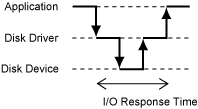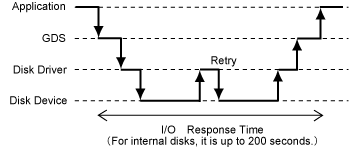The I/O Timeout can prevent the disk I/O response delay.
If an error occurs to the disk device or I/O path hardware, the device driver and hardware will repeat the retry process, and the I/O response may become delayed. If the system disk's I/O response has become delayed, the continuation of transactions will be interfered with the slowdown of the entire system.
If using the GDS and mirroring the device, and an error has occurred on one disk device, the device driver's retry process will be reduced. The disk device for which an error occurred will be disconnected from mirroring at an early stage and, so that responses can come from the normally operating disk devices, the I/O response delay will be reduced.
When 4.3A20 or later is used in Solaris 11, this function will be enabled by registering the system disk with GDS even though the ZFS mirroring function is used to make the system disk redundant.
Figure 1.14 I/O response during normal operation

Figure 1.15 I/O response delay during a disk error

Figure 1.16 Suppression of an I/O response delay during a disk error

GDS: Global Disk Services
Note
If using this function for a disk array device which the multipath is configured, use the Solaris standard multipath driver (MPxIO).
If using multipath drivers other than MPxIO, such as ETERNUS Multipath Driver, this function will not be enabled.
For the disk where a concatenation function or a striping function is used, this function will not be enabled.